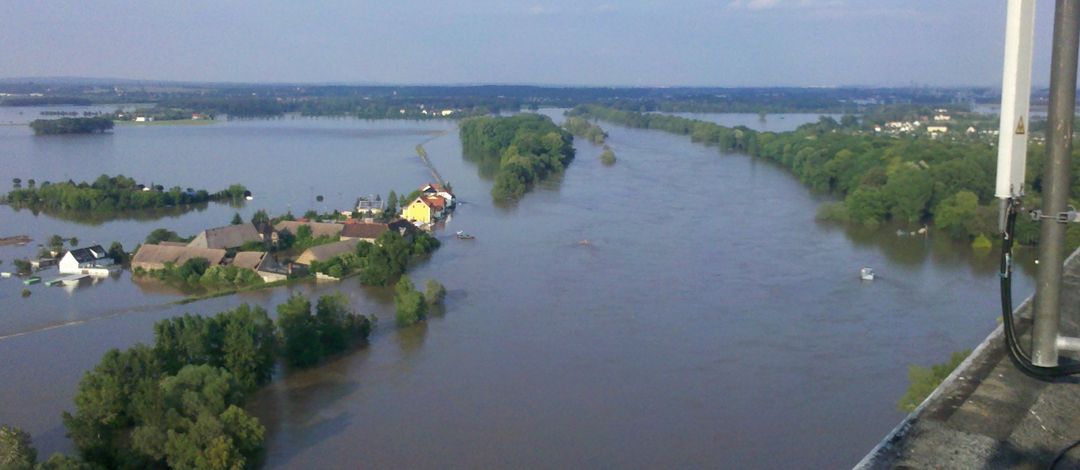Working group Climate attribution
Team
Research
The bulk oft the research is closely linked to climate change attribution. The research group uses modern empirical-quantitative statistical and machine learning methods to address these research questions and integrate different climate and Earth science data streams.
Current Research Projects
Process-based ATTribution of Extreme Temperatures to Anthropogenic drivers
Funding: Federal Ministry of Education and Research
Period: 01.10.2023 – 30.09.2026
Team: Florian Kraulich, JP Dr. Sebastian Sippel
Climate change continues despite societal targets towards emission reductions. In order to design adaption plans, we need to understand how weather extremes will develop in the climate of the future.
The aim of the PATTETA is to contribute to a better understanding of the causes of climate change-induced changes of heat weaves (greenhouse gases, aerosols, circulation changes, etc.) both in the past and for the future, and to communicate them through attribution studies.
The aim of the PATTETA is to contribute to a better understanding of the causes of climate change-induced changes of heat weaves (greenhouse gases, aerosols, circulation changes, etc.) both in the past and for the future, and to communicate them through attribution studies
PATTETA is divided into three work packages with specific objectives.
WP 1: Understanding the relative contribution of greenhouse gases and aerosols to the change in heat waves from the past to the present – under different weather conditions in
WP2: Identification of circulation-related contributions to heat waves, thermodynamic components and their uncertainties in future protections.
WP3: Contribution to the knowledge transfer to the POSTAG communication projects
The climate factors from WP1 and WP2 are evaluated separately to evaluate the evolution of weather and weather extremes under different climatic conditions.
PATTETA contributes to the attribution of cause and effect of changes in heat waves and climate change. By evaluating the various factors and their influences, climate communication regarding expected changes for society is improved.
Artificial Intelligence and machine learning for enhanced representation of Processes and EXtremes in Earth system models
Funding: European Union
Period: 01.04.2024 – 31.03.2028
Team: Dr. Peter Pfleiderer, JP Dr. Sebastian Sippel
Global warming continues at an alarming rate, presenting unprecedented challenges to society that require urgent, science-led mitigation and adaptation. Earth system models (ESMs) are essential tools for projecting climate change, providing important information to decision makers.
However, confidence in predicted climate change is undermined by a number of uncertainties;
(i) ESMs disagree on how much the Earth will warm for a given increase in atmospheric CO2 (Earth’s equilibrium climate sensitivity);
(ii) how much emitted CO2 will stay in the atmosphere to warm the planet (half the CO2 emitted by humans has been absorbed by the land and ocean) and
(iii) how much excess heat in the Earth system will enter the ocean interior, delaying surface warming (~90% of the heat in the Earth system goes into the ocean). Central to these uncertainties are poorly understood, and poorly modelled, Earth system feedbacks, in particular cloud feedbacks, carbon cycle feedbacks and ocean heat uptake. Poor representation of these phenomena degrades the accuracy of ESM projections, with implications for anticipating future climate extremes and societal impacts. We aim to improve the representation of these feedbacks in ESMs, reducing uncertainty in global warming projections. We propose a multidisciplinary approach, focused on “learning” how to accurately describe processes underpinning these feedbacks, through a fusion of observations with advanced machine learning and artificial intelligence. Such data and approaches, constrained by the laws of physics, will deliver a step change in the accuracy of Earth system models.
AI4PEX Artificial Intelligence and machine learning for enhanced representation of Processes and EXtremes in Earth system models: will place Europe at the forefront of a revolution in Earth system modelling, leading to increased accuracy of climate change projections and superior support for implementation of the Paris Climate Agreement and the European Green Deal.
Publications
Listed by year, you will find the publications of the Climate Attribution Working Group below.
- de Vries, I., Sippel, S., Pendergrass, A.G., and Knutti, R. (2022) Robust global detection of forced changes in mean and extreme precipitation despite observational disagreement on the magnitude of change. Earth System Dynamics, 14, 81-100, doi:10.5194/esd-14-81-2023. EGU Highlight Paper
- Egli, M., Sippel, S., Pendergrass, A.G., de Vries, I., and Knutti, R. (2022) Reconstruction of zonal precipitation from sparse historical observations using climate model information and statistical learning. Geophysical Research Letters, 49(23), doi:10.1029/2022GL099826.
- Li, N., Sippel, S., Winkler, A., Mahecha, M. D., Reichstein, M., and Bastos, A. (2022) Inter–annual global carbon cycle variations linked to atmospheric circulation variability. Earth System Dynamics, 13, 1505-1533, doi:10.5194/esd-13-1505-2022.
- Cortés-Andrés, J., Camps-Valls, G., Sippel, S., Székely, E., Sejdinovic, D., Diaz, E., Pérez-Suay, A., Li, Z., Mahecha, M. D., and Reichstein, M. (2022) Physics-aware nonparametric regression models for Earth data analysis. Environmental Research Letters, 17(5), 054034, doi:10-1088/1748-9326/ac6762.
- Joswig, J., Wirth, C., Reu, B., Kattge, J., Richter, R., Sippel, S., Rüger, Wright, J., van Bodegom, P., Cornelissen, J.H.C., Diaz, S., Hattingh, W.N., Kramer, K., Lens, F., Niinemets, Ü., Reich, P., Reichstein, M., Römermann, C., Schrodt, F., Anand, M., Bahn, M., Byun, C., Campetella, C., Cerabolini, B.E.C., Craine, J.M., Gonzalez-Melo, A., Gutierrez, A.G., He, T., Higuchi, P., Jactel, P., Kraft, N., Minden, V., Onipchenko, V., Peñuelas, J., Pillar, V.D., Sosinsky, V.D., Soudzilovskaia, N.A., Weiher, E.R., and Mahecha, M.D (2022) Climatic and soil factors explain the two-dimensional spectrum of global plant trait variation, Nature Ecology and Evolution 6, 36-50, doi:10.1038/s41559-021-01616-8.
- Sippel, S., Meinshausen, N., Székely, E., Fischer, E., Pendergrass, A. G., Lehner, F., and Knutti, R. (2021) Robust detection of forced warming in the presence of potentially large climate variability. Science Advances 7, eabh4429, doi:10.1126/sciadv.abh4429.
- Fischer, E., Sippel, S., and Knutti, R. (2021) Increasing probability of record-shattering climate extremes, Nature Climate Change 11, 689-695, doi:10.1038/s41558-021-01092-9.
- Heinze-Deml, C., Sippel, S., Pendergrass, A. G., Lehner, F., and Meinshausen, N. (2021) Latent Linear Adjustment Autoencoders v1.0: A novel method for estimating and emulating dynamic precipitation at high resolution. Geoscientific Model Development 14, 4977-4999, doi:10.5194/gmd-2020-275.
- Flach, M., Brenning, A., Gans, F., Reichstein, M., Sippel, S., and Mahecha, M. D. (2021) Vegetation modulates the impact of climate extremes on gross primary productivity. Biogeosciences 18, 39-53, doi:10.5194/bg-18-39-2021.
- Matthews, H. D, Tokarska, K. B., Rogelj, J., Forster, P. M., Haustein, K., Smith, C. J., MacDougall, A. H., Mengis, N., Sippel, S., and Knutti, R. (2021) An integrated approach to quantifying uncertainties in the remaining carbon budget. Communications Earth and Environment 2, 7, doi:10.1038/s43247-020-00064-9.
- Sippel, S., Meinshausen, N., Fischer, E. M., Szekely, E., and Knutti, R. (2020) Climate change now detectable from any single day of global weather. Nature Climate Change, 10, 35-41, doi:10.1038/s41558-019-0666-7. See also News&Views: doi:10.1038/s41558-019-0670-y. Editorially highlighted as one out of 10 papers in “10 years of Nature Climate Change”: doi:10.1038/s41558-021-01019-4.
- Sippel, S., Fischer, E. M., Scherrer, S., Meinshausen, N., and Knutti, R. (2020) Late 1980s climate regime shift in Switzerland explained by circulation and long-term warming. Environmental Research Letters, 15, 094056, doi:10.1088/1748-9326/ab86f2.
- Andersen, H., Cermak, J., Fuchs, J., Knippertz, P., Gaetani, M., Quinting, J., Sippel, S., and Vogt, R. (2020) Synoptic-scale controls of fog and low clouds in the Namib Desert, Atmospherics Chemistry and Physics, 20, 3415-3438, doi:10.5194/acp-2019-924.
- Tokarska, K. B., Stolpe, M. B., Sippel, S., Fischer, E. M., Smith, C. J., Lehner, F., Knutti, R. (2020) Past warming trend constrains future warming in CMIP6 models, Science Advances, 6(12), eaaz9549, doi:10.1126/sciadv.aaz9549.
- Wills, R. J., Sippel, S., Barnes, E. A. (2020) Separating forced and unforced components of climate change: The utility of pattern recognition methods in Large Ensembles and observations. CLIVAR Variations Newsletter, 18(2), 1-8, doi:10.5065/0DSY-WH17
- Sippel, S., Meinshausen, N., Merrifield, A., Lehner, F., Pendergrass, A. G., Fischer, E. M., and Knutti, R. (2019) Uncovering the forced climate response from a single ensemble member using statistical learning, Journal of Climate, 32, 5677-5699. doi:10.1175/JCLI-D-18-0882.1.
- Merrifield, A. L., Simpson, I. R., McKinnon, K. A., Sippel, S., Xie, S.-P., and Deser, C. (2019) Local and non-local land surface influence in European heatwave initial condition ensembles. Geophysical Research Letters, 46, 14082-14092, doi:10.1029/2019GL083945.
- Russo, S., Sillmann, J., Sippel, S., Barcikowska, M. J., Ghisetti, C., Smid, M., O’Neill, B. (2019) Half a degree and rapid socioeconomic development matter for heatwave risk. Nature Communications 10(1), 136, doi:10.1038/s41467-018-08070-4.
- Sippel, S., Reichstein, R., Ma, X., Mahecha, M.D., Lange, H., Flach, M. & Frank, D. (2018) Drought, heat, and the carbon cycle: A review. Current Climate Change Reports, 4(3), 266-286. doi:10.1007/s40641-018-0103-4.
- Sippel, S., El-Madany, T. S., Mahecha, M. D., Migliavacca, M., Carrara, A., Flach, M., Kaminski, T., Otto, F. E. L., Thonicke, K., Vossbeck, M., Reichstein, M. (2018). Warm Winter, Wet Spring and an Extreme Response in Ecosystem Functioning on the Iberian Peninsula. In Herring, S. C., Christidis, N., Hoell, A., Kossin, J. P., Schreck III, C. J., and Stott, P. A. (Eds.), Explaining Extreme Events of 2016 from a Climate Perspective. Bull. Amer. Meteor. Soc. (Supplement), 98 (12), S80-S85. doi:10.1175/BAMS-D-17-0135.1.
- Flach, M., Sippel, S., Gans, F., Bastos, A., Brenning, A., Reichstein, M., and Mahecha, M. D. (2018): Contrasting biosphere responses to hydrometeorological extremes: revisiting the 2010 western Russian Heatwave, Biogeosciences 16, 6067-6085. doi:10.5194/bg-15-6067-2018.
- Sillmann, J., Russo, S., Sippel, S., Alnes, K. (2018) From hazard to risk. Bull. Amer. Meteor. Soc., 99(8), 1689-1693. doi: 10.1175/BAMS-D-17-03227.1.
- von Buttlar, J., Zscheichler, J., Rammig, A., Sippel, S., Reichstein, M., Knohl, A., Jung, M., Menzer, O., Arain, M.A., Buchmann, N., Cescatti, A., Gianelle, A., Kieley, G., Law, B.E., Magliulo, V., Margolis, H., McCaughey, H., Merbold, L., Migliavacca, M., Montagnani, L., Oechel, W., Pavelka, M., Peichl, M., Rambal, S., Raschi, A., Scott, R.L., van Gorsel, E., Varlagin, A., Wohlfahrt, G. and Mahecha, M.D. (2018) Impacts of droughts and extreme temperature events on gross primary production and ecosystem respiration: a systematic assessment across ecosystems and climate zones. Biogeosciences, 5, 1293-1318. doi: 10.5194/bg-15-1293-2018.
- Lange, H., Sippel, S., Rosso, O. A. (2018) Nonlinear dynamics of river runoff elucidated by horizontal visibility graphs, Chaos: An Interdisciplinary Journal of Nonlinear Science 28(7), 075520, doi:10.1063/1.5026491.
- Mitchell, D., Heaviside, C., Schaller, N., Allen, M. R., Ebi, K., Fischer, E. M., Gasparrini, A., Harrington, L., Kharin, V. V., Shiogama, H., Sillmann, J., Sippel, S., and Vardoulakis, S. (2018) Extreme heat-related mortality avoided under Paris Agreement goals, Nature Climate Change 8(7), 551, doi:10.1038/s41558-018-0210-1.
- He, W., Ju, W., Schwalm, C. R. , Sippel, S., Wu, X., He, Q., Song, L., Zhang, C., Li, J., Sitch, S., Viovy, N., Friedlingstein, F., and Jain, A. K. (2018) Large‐Scale Droughts Responsible for Dramatic Reductions of Terrestrial Net Carbon Uptake Over North America in 2011 and 2012, Journal of Geophysical Research: Biogeosciences, 123(7), 2053-2071, doi:10.1029/2018JG004520.
- Wu, D, Ciais, P., Viovy, N., Knapp, A. K., Wilcox, K., Bahn, M., Smith, M. D., Vicca, S., Fatichi, S., Zscheischler, J., He, Y., Li, X., Ito, A., Arneth, A., Harper, A., Ukkola, A., Paschalis, A., Poulter, B., Peng, C., Ricciuto, D., Reinthaler, D., Chen, G., Tian, H., Genet, H., Mao, J., Ingrisch, J., Nabel, J. E. S. M., Pongratz, J., Boysen, L. R., Kautz, M., Schmitt, M., Meir, P., Zhu, Q., Hasibeder, R., Sippel, S., Dangal, S. R. S., Sitch, S., Shi, X., Wang, Y., Luo, Y., Liu, Y., and Piao, S. (2018) Asymmetric responses of primary productivity to altered precipitation simulated by ecosystem models across three long-term grassland sites, Biogeosciences, 15, 3421-3437. doi:10.5194/bg-15-3421-2018.
- Sippel, S., Forkel, M., Rammig, A., Thonicke, K., Flach, M., Heimann, M., Otto, F. E. L., Reichstein, M., and Mahecha, M. D. (2017) Contrasting and interacting changes in spring and summer carbon cycle extremes in European ecosystems. Environmental Research Letters, 12(7), 075006. doi:10.1088/1748-9326/aa7398.
- Sippel, S., Zscheischler, J., Mahecha, M. D., Orth, R., Reichstein, M., Vogel, M., and Seneviratne, S. I. (2017) Refining multi-model projections of temperature extremes by evaluation against land–atmosphere coupling diagnostics. Earth System Dynamics, 8, 387-403. doi:10.5194/esd-8-387-2017.
- Sippel, S, Zscheischler, J., Heimann, M., Lange, H., Mahecha, M. D., van Oldenborgh, G. J., Otto, F. E. L., and Reichstein, M. (2016) Have precipitation extremes and annual totals been increasing in the world's dry regions over the last 60 years? Hydrology and Earth System Sciences, 21, 441-458. doi:10.5194/hess-2016-452.
- Flach, M., Gans, F., Brenning, A., Denzler, J., Reichstein, M., Rodner, E., Bathiany, S., Bodesheim, P., Guanche, Y., Sippel, S., and Mahecha, M. D. (2017) Multivariate Anomaly Detection for Earth Observations: A Comparison of Algorithms and Feature Extraction Techniques. Earth System Dynamics, 8, 677-696. 10.5194/esd-8-677-2017.
- Ilie, I., Dittrich, P., Carvalhais, N., Jung, M., Heinemeyer, A., Migliavacca, M., Morison, J. I. L., Sippel, S., Subke, J.-A., Wilkinson, M., and Mahecha, M. D. (2017) Reverse engineering model structures for soil and ecosystem respiration: the potential of gene expression programming. Geoscientific Model Development, 10, 3519-3545. doi:10.5194/gmd-10-3519-2017.
- Mahecha, M. D., Gans, F., Sippel, S., Donges, J. F., Kaminski, T., Metzger, S., Migliavacca, M., Papale, D., Rammig, A., and Zscheischler, J. (2017) Detecting impacts of extreme events with ecological in-situ monitoring networks. Biogeosciences, 14, 4255-4277. doi:10.5194/bg-14-4255-2017.
- Sippel, S., Lange, H., Mahecha, M. D., Hauhs, M., Bodesheim, P., Kaminski, T., Gans, F., and Rosso, O. A. (2016) Diagnosing the Dynamics of Observed and Simulated Ecosystem Gross Primary Productivity with Time Causal Information Theory Quantifiers. PLoS ONE, 11(10), e0164960. doi:10.1371/journal.pone.0164960.
- Sippel, S., Otto, F. E. L., Flach, M., and van Oldenborgh, G. J. (2016). The Role of Anthropogenic Warming in 2015 Central European Heat Waves. In Herring, S. C., Hoell, A., Hoerling, M. P., Kossin, J. P., Schreck III, C. J., and Stott, P. A. (Eds.), Explaining Extremes of 2015 from a Climate Perspective. Bull. Amer. Meteor. Soc. (Supplement), 97(12), S51–S56. doi:10.1175/BAMS-D-16-0149.
- Sippel, S., Otto, F. E. L., Forkel, M., Allen, M. R., Guillod, B. P., Heimann, M., Reichstein, M., Seneviratne, S. I., Thonicke, K., and Mahecha, M. D. (2016) A novel bias correction methodology for climate impact simulations. Earth System Dynamics, 7, 71-88. doi:10.5194/esd-7-71-2016.
- Sippel, S., Zscheischler, J., and Reichstein, M. (2016) Ecosystem impacts of climate extremes crucially depend on the timing. Proceedings of the National Academy of Sciences, 113(21), 5768-5770. doi:10.1073/pnas.1605667113.
- Sippel, S., Zscheischler, J., Heimann, M., Otto, F. E. L., Peters, J., and Mahecha, M. D. (2015) Quantifying changes in climate variability and extremes: Pitfalls and their overcoming, Geophysical Research Letters, 42(22), 9990–9998. doi:10.1002/2015GL066307.
- Sippel, S., Mitchell, D., Black, M. T., Dittus, A. J., Harrington, L., Schaller, N., and Otto, F. E. L. (2015) Combining large model ensembles with extreme value statistics to improve attribution statements of rare events. Weather and Climate Extremes 9, 25-35. doi:10.1016/j.wace.2015.06.004.
- Sippel, S., Walton, P., and Otto, F. E. L. (2015) Stakeholder perspectives on the attribution of extreme weather events: An explorative enquiry. Weather, Climate and Society 7(3), 224-237. doi:10.1175/WCAS-D-14-00045.1.
- Liu, M., Dannenmann, M., Lin, S., Saiz, G., Yan, G., Yao, Z., Pelster, D., Tao, H., Sippel, S., Tao, Y., Zhang, Y, Zheng, X., Zuo, Q., and Butterbach-Bahl, K. (2015) Ground cover rice production systems increase soil carbon and nitrogen stocks at regional scale. Biogeosciences 12(15), 4831-4840. doi:10.5194/bg-12-4831-2015.
- Sippel, S. & Otto, F. E. L. (2014) Beyond climatological extremes - assessing how the odds of hydrometeorological extreme events in South-East Europe change in a warming climate. Climatic Change 125, 381-398. doi:10.1007/s10584-014-1153-9.
Pre-2014
- Liu, M., Lin, S., Dannenmann, M., Tao, Y., Saiz, G., Zuo, Q., Sippel, S., Wei, J., Cao, J., Cai, X., and Butterbach-Bahl, K. (2013) Do water-saving ground cover rice production systems increase grain yields at regional scales? Field Crops Research 150, 19-28. doi:10.1016/j.fcr.2013.06.005.
- Dannenmann, M., Willibald, G., Sippel, S. & Butterbach-Bahl, K. (2011) Nitrogen dynamics at undisturbed and burned Mediterranean shrublands of Salento Peninsula, Southern Italy. Plant and Soil 343(1-2), 5-15. doi:10.1007/s11104-010-0541-9.
2020
- Vignotto, E., Sippel, S., Lehner, F., Fischer, E. M. (2020) Towards dynamical adjustment of the full temperature distribution. Published in Proceedings of the 10th International Workshop on Climate Informatics.
- Lange, H., and Sippel, S. (2020) Machine Learning Applications in Hydrology. In Levia, D.F., Carlyle-Moses, D. E., Iida, S., Michalzik, B., Nanko, K. and Tischer, A. (Eds.), Forest-Water Interactions. Ecological Studies Series 240, pp. 233-257, Springer-Verlag, Heidelberg, Germany.
2019
- Székely, E., Sippel, S., Knutti, R., Obozinski, G. and Meinshausen, N. (2019) A direct approach to detection and attribution of climate change. In Brajard, J., Charantonis, A., Chen, C., & Runge, J. (Eds.), Proceedings of the 9th International Workshop on Climate Informatics: CI 2019 (No. NCAR/TN- 561+PROC), pp. 119-124, doi:10.5065/y82j-f154. See also arXiv preprint, arXiv:1910.03346.
- Sillmann, J., Sippel, S. and Russo, S., (Eds.) Climate extremes and their implications for impact and risk assessment, 376 pages, Elsevier. ISBN 978-0-12-814895-2, doi.org/10.1016/C2017-0-01794-9.
- Sillmann, J., and Sippel, S. (2019) Climate extremes and their implications for impact and risk assessment: A short introduction. In Climate Extremes and Their Implications for Impact and Risk Assessment (pp. 1-9). Elsevier.
- Cannon, A. J., Piani, C., and Sippel, S. (2019) Bias correction of climate model output for impact models. In Climate Extremes and Their Implications for Impact and Risk Assessment (pp. 77-104). Elsevier.
- Reichstein, M., Frank, D., Sillmann, J., & Sippel, S. (2019) Outlook: Challenges for societal resilience under climate extremes. In Climate Extremes and Their Implications for Impact and Risk Assessment (pp. 341-353). Elsevier.
2016
- Guanche, Y. G., Rodner, E., Flach, M., Sippel, S., Mahecha, M. D., and Denzler, J. Detecting multivariate biosphere extremes. In Banerjee, A., Ding, W., and Dy, V., (Eds.), Proceedings of the 6th International Workshop on Climate Informatics: CI2016. NCAR, 2016. NCAR Technical Note NCAR/TN-529+PROC (pp. 9-12).
Contact us
Leipzig Institute for Meteorology
Working group Climate Attribution
Talstraße 35
04103 Leipzig
Phone: +49 341 97-
Fax: +49 341 97-32899



